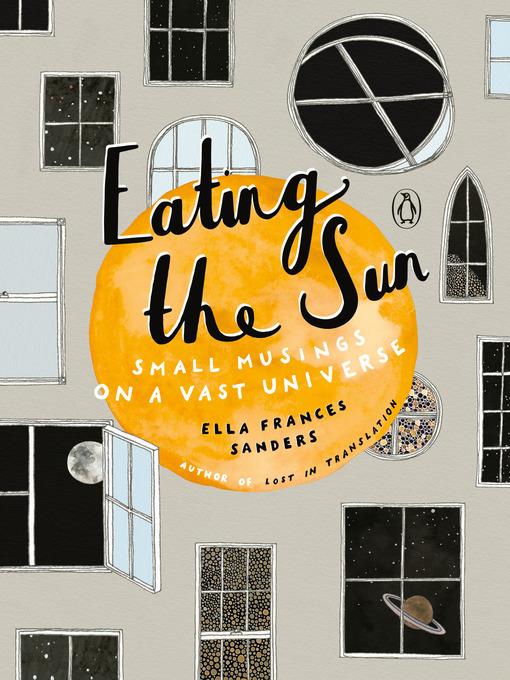
Eating the Sun
Small Musings on a Vast Universe
کتاب های مرتبط
- اطلاعات
- نقد و بررسی
- دیدگاه کاربران
نقد و بررسی

Starred review from October 22, 2018
In this small volume, Sanders (Lost in Translation) beautifully personifies the universe with lyrical prose and whimsical color illustrations. Brief chapters discuss numerous natural phenomena or theoretical concepts in poetic yet scientifically illuminating ways, ranging from the life cycles of suns through Darwinian evolution to geosmin, the smell of damp earth, which “leaves a person feeling as clean as if they had been dragged backwards through a cloud.” Readers learn how blue skies exist because “blue has shorter, smaller wavelengths, and is therefore scattered more”; how the modern understanding of time “is built on Einstein’s general theory of relativity, in which time is just a coordinate”; and a little about various other science concepts too numerous to list. Sanders further outlines why scientific language is so often foreign and frustrating to nonscientists: “it takes familiar words and puts them in entirely different contexts” while also introducing “a whole other vocabulary that a person would never normally have reason to encounter.” But in her fluidly conversational style, Sanders renders that language both accessible and appealing to her audience. Even more importantly, she consistently captures a sense of awe and wonder at the universe, and ignites (or reignites) that same sense in the reader. Agent: Jennifer Weltz, Jean V. Naggar Literary.

February 15, 2019
A wonder-filled excursion into the sometimes-baffling and formidable world of science.Sanders (The Illustrated Book of Sayings: Curious Expressions from Around the World, 2016, etc.) takes readers on a lively, nonstressful journey through the world of science in short chapters or "musings," each accompanied by her own whimsical color line drawings. Presenting information in a charming, conversational style, the author seeks to demystify science with panache. Each "muse" covers one specific topic, mostly astronomical but some natural and human sciences as well. She avoids scientific language, which "isn't designed to appeal to human ears, isn't especially melodic"; it "remains stubbornly inaccessible for most nonscientists." However, she will resort to some when the need arises--e.g., eigengrau, the gray color eyes see in the dark, or chronoception, the perception of time. Sanders also enlists the services of professionals such as physicist Ludwig Boltzmann, astronomer Arthur Eddington, and physicist Richard Feynman. Sanders is quite fond of statistics and factoids, and most of them are useful. Someone who is 80 years old "may have taken more than 700 million breaths" and walked the "equivalent of Earth's circumference five times...more than 110,000 miles during their lifetime." Their hearts will have beat 2.6 billion times. In the titular piece, about the sun, photosynthesis, and plants, the author discusses the "digestible sun fuel that we are consuming....It's astonishing to think that we have been solar powered since the beginning of anything at all." Plants, scientists have discovered, possess "memory, learning, and problem-solving," and "more than one in five is threatened with extinction." While there are more than 3 trillion trees on Earth, "they can't keep up with the amount of carbon dioxide that we are pouring into the atmosphere." Planting more "seems a more important pastime than ever," and global warming is even "having an effect on the very spin of Earth."A fun, accessible introduction to a variety of scientific topics that readers can explore further. For Sanders, "everything is fascinating," and she hopes readers will agree.
COPYRIGHT(2019) Kirkus Reviews, ALL RIGHTS RESERVED.

April 1, 2019
In this latest work, Sanders (The Illustrated Book of Sayings) randomly arranges more than 50 brief essays on life and physical sciences topics, each illustrated in her distinctive style. The author's existing fan base may welcome her foray into new subject material and lengthier pieces, especially as she has not abandoned her trademark arch commentary. However, the pervasive anthropomorphizing, unsupported generalizations (such as asserting that dying stars hurl 40,000 tons of material toward us annually despite researchers' disagreement about the quantity), quirky prose (all physicists are "brilliant" while their astronomer disciplinary cousins earn fewer accolades), and unquestioning credulity in this title may annoy general popular science audiences. More traditionally appealing alternatives include works from Brian Cox's Wonders of... or Jerry Dennis's "The Wonders of Nature" series. VERDICT Readers seeking an atypical beach read for their vacations may enjoy this playful work.--Nancy R. Curtis, Univ. of Maine Lib., Orono
Copyright 2019 Library Journal, LLC Used with permission.

March 1, 2019
In this sweet and optimistic new book, author-illustrator Sanders explores the sweeping science of the universe and then breaks it down so that even right-brainers and hopeless romantics can comprehend. The book is a collection of one- to two-page explanations of some of science's biggest concepts, each with an adorable accompanying illustration. What makes the book so unique and delightful are the subjectively positive closing lines of each otherwise objective section; Sanders concludes every piece with a bit of hopefulness or wisdom that puts the illustrated principle into human perspective. For example, Sanders writes this of the beautiful partnership that the Earth shares with the moon: "How glad we can be, that we have someone to figure out this universe business alongside, to dance with, to gradually lengthen our days and keep us slow." Sanders' marveling is inspiring and sure to be contagious, even for the least scientifically minded of readers. As Sanders explains, we're all just small lumps of space matter that feed on particles of the sun. Why make life so complicated?(Reprinted with permission of Booklist, copyright 2019, American Library Association.)

























دیدگاه کاربران